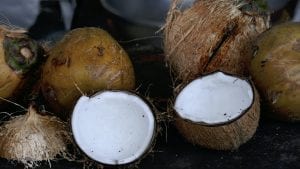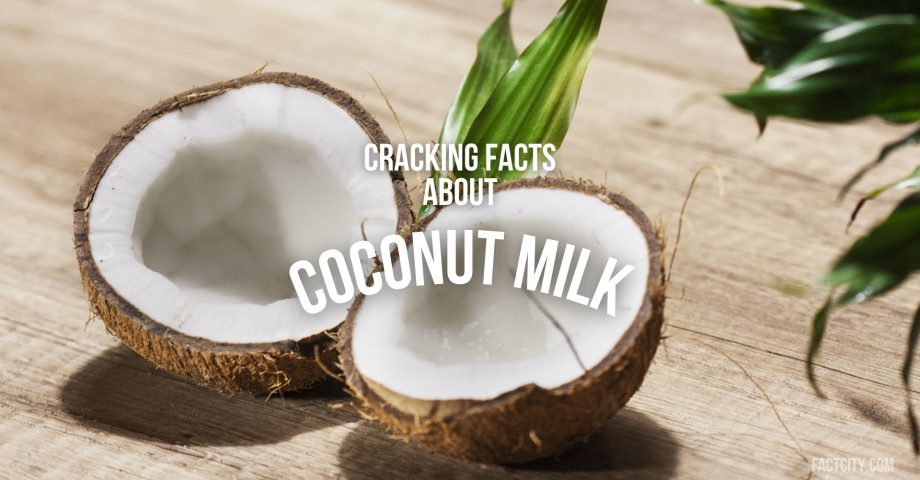While it’s not technically milk, that hasn’t stopped the liquid insides of the average coconut from becoming highly popular with the masses! However, did you know that coconut milk is different from coconut water? It’s also said to contain some fantastic health benefits. Let’s take a look at some fun facts about coconut milk to help clue you in.
1. Coconut milk and coconut water are different things.
You can’t get coconut milk directly from raw coconuts – you’ll find coconut water inside the raw product, whereas milk is made by mixing coconut flesh with external water. It’s made either thick or thin, and is typically boiled, simmered, and strained.
2. Coconut milk is high in calories.
Coconut water is fairly low-calorie, but the flesh from the fruit is quite the opposite. A single cup of coconut milk reportedly contains around 552 kcal and 57 grams of fat! That said, many people claim coconut milk holds deeper health benefits, meaning it might just be worth enjoying it sparingly.
3. Coconut milk’s acid content could support weight loss.
Despite being high in calories, coconut milk contains lauric acid, a mid-to-long chain fatty acid which is said to have reasonable metabolic effects. However, coconut milk also contains shorter chained fatty acids that go directly to vital organs, meaning they are unlikely to store as body fat.

4. Lauric acid could help support a healthy heart.
The lauric acid content in coconut milk could help people manage their cholesterol – it’s well-known as an antioxidant. That said, milk’s high fat content goes against the idea that it’s good for the heart – meaning there’s more research required before we can give this fact to you as 100% certain.
5. It’s a great source of vitamins.
Coconut milk, for all its calorie controversies, is actually a reliable source of several essential vitamins. For example, it’s host to high levels of Vitamins A, B12, and D2. It’s also rich in calcium, much like the pasteurized dairy milk you’d find at the grocery store.
That said, some experts advise that replacing dairy milk with coconut milk could lead to deficiencies in calcium and Vitamins A and D. Or, if you prefer to avoid dairy completely, supplement these vitamins elsewhere in your diet.
6. Coconut milk is ideal for people with lactose intolerance.
People suffering from lactose intolerance – who cannot eat or drink dairy products or risk allergic reactions – may find coconut milk a viable alternative to everyday dairy. What’s more, they can either purchase the milk straight out of cans or cartons, or can mix their own up from home with a stove and by cracking open their own coconuts!
7. Coconut milk is extremely popular with vegans and vegetarians.
As a viable alternative to consuming dairy, coconut milk is naturally popular with those avoiding animal products in their diets. In fact, it’s often found as an ingredient alternative to dairy in products such as vegan-friendly cheese.
8. It could be anti-inflammatory and anti-fungal.
While its nutritional value is controversial, some studies claim that consuming coconut milk can protect the body against certain organisms that cause illness and disease. This, again, is thanks to the presence of lauric acid – which makes up around half of all the fatty acids you’ll find in coconut milk. Therefore, balanced with a healthy diet, you might find coconut milk helps you stave off infections and illnesses.
9. Some people might be allergic to coconut milk.
Although rare, caution is advised when trying coconut milk as it can potentially cause allergic reactions. For example, anyone drinking the milk with allergies to tree pollen might suffer ill effects – it’s wise to ask your doctor if it’s safe to drink coconut milk before you start.

FAQs about Coconut Milk
Is coconut milk as healthy as ordinary milk?
Coconut milk is fairly high in calories and fat, but is considered one of the healthier milk alternatives available. It’s a good source of calcium, for example, for those avoiding dairy.
Can you drink coconut milk straight?
Coconut milk isn’t necessarily made to drink straight from a glass, but many people do – by boiling or simmering coconut flesh at home. Many people use it as a common ingredient in recipes where they want to avoid using dairy.
What are the benefits of coconut milk?
Although many of the reported health benefits of coconut milk require additional research, some people report that drinking it can help to boost your immune system and might help aid weight loss. However, always ask a doctor or nutritionist before trying it yourself.
Further reading
https://facts.uk/tag/coconuts
https://www.bonappetit.com/story/what-is-coconut-milk
https://www.sciencedirect.com/topics/agricultural-and-biological-sciences/coconut-milk
Do you know any nutrition facts about coconut milk? Share them in the comments below!









